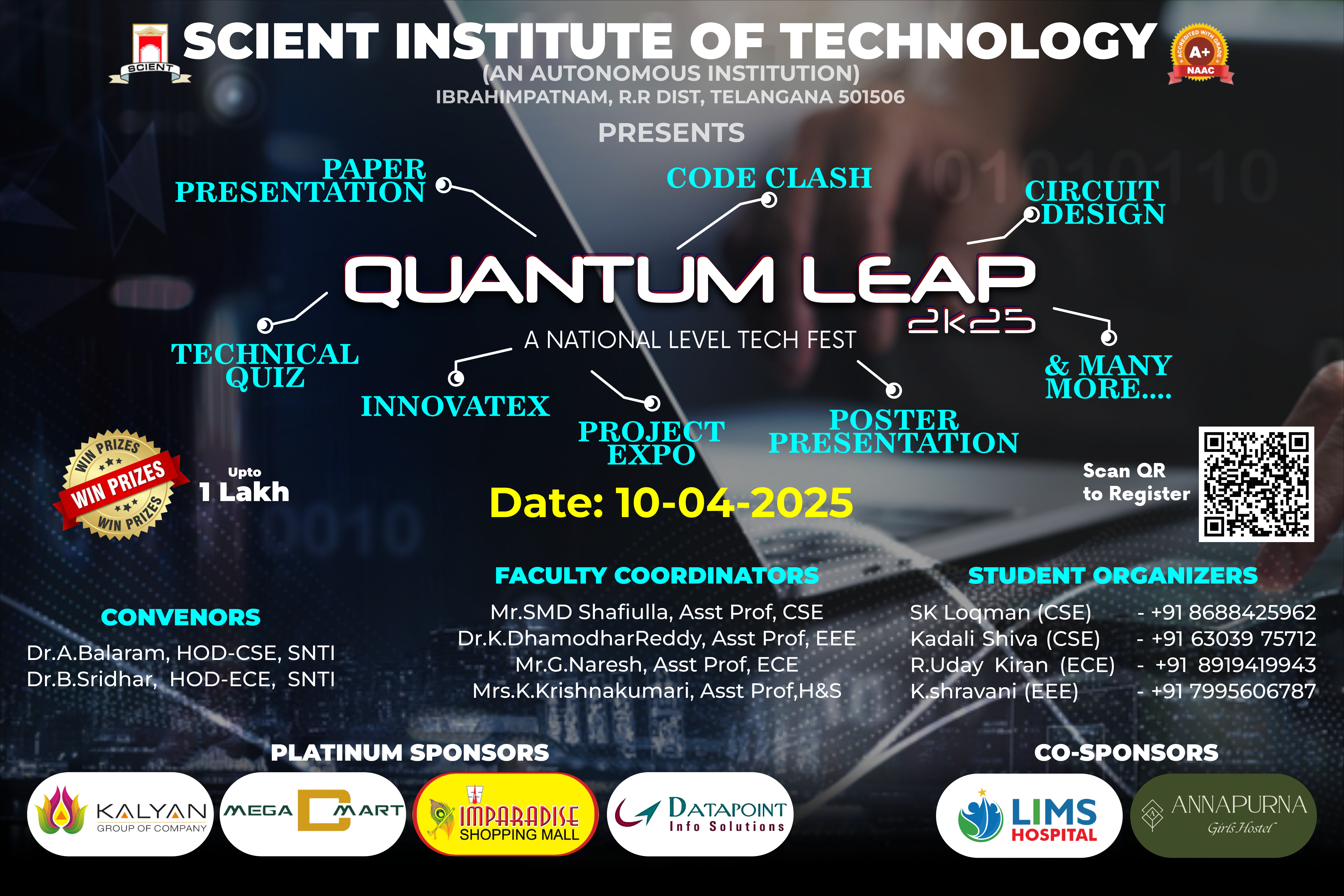Quantum Leap 2K25

Last
date to register into an event : 28.03.2025
Click here to download INFORMATION BROCHURE
FEE PARTICULARS
Rs
100/- per author per event
Rs
150/- for team at CodeClash
GUIDELINES
PAPER PRESENTATION
Domains
CSE & ALLIED BRANCHES
1) Machine Learning
2) Artificial Intelligence
3) Internet of Things
4) Generative AI
5) Cloud computing
6) Deep learning
7) Cyber security
8) Quantum Computing
ECE
1) VLSI
2) Embedded Systems
3) Signal
Processing
4) Telecommunications
EEE
1) Renewable energy
2) Energy saving technologies
3) Nano technologies
4) AI & IOT in power sector
5) Electrical Hybrid vehicles
6) Wireless power transmission
7) Battery Technologies
8) Flexible AC transmission system
Submission Guidelines:
1) Abstract must contain central research question and research design along with the proposed title and keywords (not more than 250 words).
2) Number of team members should not exceed two
3) All manuscripts must be original works of the authors. Plagiarized content beyond 15% will not be eligible for publication.
4) Time Duration for Paper Presentation: 15 minutes in total, i.e., 12 minutes for presentation and 3 minutes for questions & answers, and comments.
Formatting
Guidelines: -
Body:
Font – Times New Roman, Font size- 12, Line spacing- 1.5, Alignment- Justified.
–
Footnotes:
Font – Times New Roman, Font size- 10, Line spacing- 1, Alignment- Justified.
Submission
Process:
To submit your manuscripts for the Paper presentation,
please follow the guidelines below:
1. Save your manuscript in .doc/.docx format using
Microsoft Office 2007 or a newer version.
2. Send your manuscript
as an email attachment to quantumleap2k25snti@gmail.com
3. Use "Submission—Paper presentation"
as the subject line of your email.
4. Make sure to send your manuscript only to the
specified email address mentioned above.
IMPORTANT
DATES
Last date to register : 28.03.2025
All abstracts in the prescribed format should reach the mentioned email id on or before
31/03/2025.
Date of acceptance: 04.04.2025
POSTER PRESENTATION
1) Poster should be 3ft(W)X4ft(L)
2) Posters should include text and graphics and use color to add emphasis and clarity.
3) Illustrations should be simple and bold, and photos should clearly show pertinent details.
4) Displayed materials should be self-explanatory and should enhance the verbal presentation and discussion.
5) Speak clearly and loud enough for observers to hear you.
INNOVATEX
INNOVATEX is an idea pitching competition
Download template : Click here
The focus is on generating ideas and concepts that can be further developed into actual products or solutions.
CIRCUIT DESIGN (ECE&EEE):
Circuit design is the process of creating electrical circuits that perform a specific function or task. It involves planning, designing, and arranging the components of a circuit, such as resistors, capacitors, diodes, transistors, and other electronic parts, to achieve a desired outcome (e.g., amplifying signals, controlling power, or processing information).
PROJECT EXPO (ECE&EEE):
A project expo is an event where individuals or groups display the projects they have worked on, often as part of an academic course, competition, or research initiative. This can include working prototypes, models, or presentations demonstrating the project’s design, functionality, or research results. Participants in a project expo have the opportunity to showcase their work to an audience, often with judges who assess the quality, creativity, and impact of the projects.
TECHNICAL QUIZ (CSE, ECE&EEE):
A technical quiz is a type of quiz or competition that focuses on testing participants' knowledge and understanding of technical topics, which may include areas such as engineering, computer science, information technology, electronics, mechanics, programming, and other specialized fields. The questions in a technical quiz typically involve concepts, theories, practical applications, and problem-solving skills related to these areas.
CODE CLASH (Hackathon for CSE): The Code Clash (CC) is a dynamic team-based competition that pushes participants to demonstrate confidence, problem-solving abilities, and presentation skills. Participants will tackle challenges provided by their opponents and the Judges in fast-paced rounds.
Objectives:
Encourage collaboration and teamwork.
Test problem-solving abilities using resources like AI, GitHub, and other tools.
Develop presentation and decision-making skills under time constraints.
Team Formation
Guidelines for Teams:
o Each team must consist of 2 to 3 members.
o A total of 20 teams (example) will participate.
o Teams will be identified by numbers (e.g., Team 1, Team 2, etc.).
PROJECT EXPO:
General Rules and Guidelines for Project EXPO
• Each team can have maximum of 4 members.
• The competition is open to only under graduate students.
• Members should have a valid student ID card of their college.
• A team member can participate in only one project presentation.
Regulations for competition and display of Project :
Student taking part in project exhibition event should follow certain rules regarding the event.
1) The project for competition must be displayed and should describe the project
2) The candidates can take help of following points to describe their project in the ppt.
• Introduction
• Block diagram
• Working principle.
• Its advantage and disadvantages
• Future Work
4 ) Participants must exhibit their project in the event of Project EXPO . on 10th April 2025
5) Teams will be given a space to set up their model/design at the venue for exhibition
Important note:
• Partial outputs are considered.
• All selected participants will receive participation certificate.
• Participants should bring all their requirements to execute their project.
• The decision of the judges shall be treated as final and binding.
• The organizers reserve the rights to change any or all of the above rules as they deem fit
Judging:
Key Evaluation Criteria would be
• Innovation
• Design (Compactness and the efficiency of work done)
• Efficiency (Performance of said task)
• Relevance with practical need.



